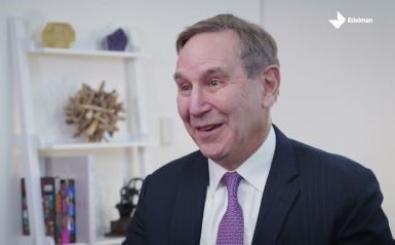Between 23 and 26 May Europeans from the 28 EU members states voted in order to decide the composition of the European Parliament for the next five years.
It seems that the uncertainties around the European project – Brexit, the predicted growing support to nationalist movements, migration-related challenges and the tensions at international level – contributed to improve voters’ turnout, which increased for the first time since the first election in 1979 (from 42.6 percent in 2014 to 50 percent in 2019).
|
There's more to Europe's Year of Change than the Parliament. That's why we produced a complete guide to everything you need to know.
|
The results

EU elections 2019 started with a big surprise, as the first country to vote – the Netherlands – delivered an unexpected win for the Dutch Labor Party, which doubled its results compared to the 2014 elections. In contrast, the Dutch Eurosceptic’s party, Forum for Democracy, came fourth.
Overall results however confirmed the latest projections, with the centre-right EPP losing ground but remaining the biggest political group with 180 seats, followed by the centre-left S&D with 146 seats1. The performance of the first two political groups, who lost a total of 77 seats, provides the first important takeaway of these elections: for the first time the two groups will not able to secure an absolute majority (376 votes) together.
If EPP and S&D lost seats, the Liberals (ALDE) managed to get significant gains, moving from 76 to 109 seats and becoming the third-biggest group in the European Parliament. The same applies to the Greens, who went from 57 to 69 seats thanks to historic performances in Germany and France.
When it comes to Eurosceptic parties, the wins of Marine Le Pen’s National Rally, Salvini’s Lega and Nigel Farage’s Brexit Party are definitely significant and provide a clear indication of the sentiment around the EU project in three big member states; however, Eurosceptic parties are likely to get around 112 seats, a number that will limit their influence in the European Parliament’s decision making process.
Important to remember: UKIP won 24 MEPs in 2014. All the charts and graphics show 'growth' of 29 seats for the Brexit Party. They did very well, but not THAT much better than last time. https://t.co/uqThSHXvM5
— Rowan Emslie (@RowanEmslie) May 27, 2019
The new balance of power
The results outlined above will make it more difficult for the European Parliament to pass legislation and agree on other important decisions (such as the upcoming elections of the President of the European Commission), due to increasing fragmentation and the fact that two political groups are not able to secure an absolute majority anymore.
This situation is likely to play in favor of ALDE, who will be decisive in order to form the majorities needed. Indeed, a coalition including EPP, S&D and liberals would be able to deliver 435 votes. Other configurations do not seem to be able to ensure a majority: a right-wing alliance (EPP, ECR, ENL) would deliver only 297 votes, while a left/Greens alliance (S&D, Greens, GUE) would deliver only 254.
Finally, even if all Eurosceptic groups (ENL, EFDD) would join forces with right-wing groups (EPP, ECR) – which in any case is not likely – they would still need another 25 votes in order to find a majority.
If Eurosceptics will struggle to influence the day-to-day legislative activities of the European Parliament, they might be more successful in shaping the strategic and long-term political agenda of the EU in the European Council, where heads of state or government of the 28 EU member states defines the direction when it comes to important issues such as the Eurozone, taxation, foreign policy and security. Indeed, Eurosceptics are in government in Italy, Poland and Hungary, and the EU elections showed that they are gaining consensus in other countries, such as France and Belgium.
.@MartinSelmayr at @POLITICOEurope @MicrosoftEU #EUdecides event says major political families should follow Spitzenkandidat "lead candidate" process. "Why should they go for someone else?" he asks @PoliticoRyan "All these pro-European forces will have to work together"
— David M. Herszenhorn (@herszenhorn) May 27, 2019
Open questions
The results provide a good overview of how the new European Parliament will look. But there are still things that we don’t know.
In the coming weeks, parties will negotiate the official formation of political groups (which require at least 25 MEPs from 7 different member states). The deadline to form a group is set on 24 June and significant changes could still happen before that date.
The biggest question mark is represented by whether a new liberal group including Macron’s En Marche will be joining the ALDE group, actually creating the third biggest group in the European Parliament, and whether this ‘new center’ will include also MEPs traditionally affiliated to other political groups (e.g. the S&Ds).
Additionally, it is still unclear whether Orban’s Fidesz party – who managed to get 52% of the votes in Hungary – will still be part of the EPP group or will join a new Eurosceptic group. When it comes to Eurosceptics, if a new group is likely to be established under the leadership of Matteo Salvini, existing Eurosceptic groups such as the Europe of Freedom and Direct Democracy, may disappear.
The first challenge
Leaders will have to speed up negotiations talks, as the first important milestone of the new political term is coming up quickly.
During the first plenary session scheduled on the first week of July, Members of the European Parliament will have to elect the new president of the European Commission, after member states nominate a candidate for the post.
In the run-up to the election of the new president, a key milestone is represented by the extraordinary meeting of the 28 heads of states and governments scheduled on 28 May, where the results of the EU elections will be discussed with a view on agreeing the name of the candidate for the role of European Commission’s President.
Considering the results of the elections, EPP’s Manfred Weber remains favorite to take the top job. However, this is not a given and the EPP will have to work hard in the coming weeks in order to build a majority: the increased fragmentation of the European Parliament is already having an impact on how decisions are taken at EU level.
Please note that this piece is based on the last update provided on 27 May at 14.37. It will be updated with final numbers as soon as they are made available.
What happens next
| European Elections | |
| European Council extraordinary meeting after the EU elections – Spitzenkandidat dilemma and other top jobs will be high in the agenda | |
| European Council meeting – adoption of the Strategic Agenda | |
| 2 July 2019 | 1st Plenary session – election of the President of the European Parliament |
| 15 July 2019 | 1st opportunity for the European Parliament to elect the President of the European Commission nominated by the European Council |
| September-October 2019 | Hearings of Commissioners-designate in Parliamentary committees |
| October 2019 | New Commission is elected by the European Parliament |
| October-November 2019 | Commission taking office |





